Sunday, April 7:
Majorie Traitor Greene thinks these are all signs from God (HERE) -- although the election that sent her to Congress is probably a more telling sign of the coming apocalypse. LOL -- this past week an Evangelical pastor said Jesus' return won't be any time soon because people aren't giving enough money to the church, HERE. C'mon people -- send it every dime ya got!
But I digress. Back to the eclipse!
Emily Dickinson used the word "eclipse" in nine different poems, and today I posted one of them, "Sunset at Night -- is natural," as one of our Featured Poems of the Week (below on the right). Dickinson was inspired to write that poem after reading her third-cousin Emmett Lee Dickinson's poem, "Coffee at Dawn -- is natural," which I posted as our other Featured Poem (below on the left).
BUT -- our eclipse fun won't stop there! No, we're going to publish Dickinson-related eclipse and astronomy posts every day this week -- so check-in each day to see what in the world -- or should I say "what in the heavens" -- is going on!
One last word about tomorrow: Don't look directly into the sun -- it could cause eye damage! And if you ever happen to spot MTG on the street, don't stare directly at her -- it will definitely cause brain damage!
| By Emmett Lee Dickinson: Coffee at Dawn – is natural – But Coffee in the Night Reverses Nature – Makes it – So Midnight’s – more – like Noon. Insomnia is – predicted – And Sleepless hours begin – And slows the Clock face certainly – Java’s at Dusk – are wrong. | By Emily Dickinson: Sunset at Night – is natural – But Sunset on the Dawn Reverses Nature – Master – So Midnight's – due – at Noon. Eclipses be – predicted – And Science bows them in – But do One face us suddenly – Jehovah's Watch – is wrong. |
Sun Day on Monday, April 8:
| The big day is today -- hopefully it won't be too cloudy! Well, if you end up not being able to see the eclipse, you can read about eclipses here because... Emily Dickinson used the word “eclipse” in nine different poems, and yesterday I posted one of them, “Sunset at night – is natural,” as one of my Featured Poems of the Week on this site. Info & that poem are above. Another poem about an eclipse by Dickinson is “It sounded as if the Streets were running,” pictured below. |
| I love that opening stanza -- how the "Streets were running" with everyone going about their business -- and then "the Streets stood still" as everyone looked up in awe! This poem was written in 1877. There were three partial eclipses that year -- one in North America -- so it is very possible that this poem was written in direct response to seeing or hearing about an eclipse. I’m not sure of the year, but Dickinson also wrote a second version of this poem where she replaced “street” with “air,” It sounded as if the Air were running.” Personally, I prefer “streets” over “air.” In this poem, Nature is in a “beryl” apron (vs. “opal”), and Dickinson considered the word “bluest” as well. |
Our solar eclipse coverage continues tomorrow! ; )
Tuesday, April 9:
I was able to see the first half before the clouds rolled in!
In case you not familiar with the name “Mabel Loomis Tood,” here’s some background:
David Peck Todd was a graduate of Amherst College in 1875, and in 1879 he married Mabel Loomis. From 1881 to 1917 he was a professor of astronomy and director of the observatory at Amherst College, and during that time, Mabel Loomis Todd began an affair with Austin Dickinson, the married brother of Emily Dickinson. Following Emily Dickinson’s death, Mabel and ED’s mentor Thomas Wentworth Higginson published a series of poetry books with ED’s poetry. The first came out in 1890.
There’s a LOT more to that story – about the affair, the early publications, the family feud that ensued, the court cases involving copyrights and ownership of Dickinson’s poetry and letters, and so on – but that at least gives you an idea of who Mabel Loomis Todd was.
| Here is some of the write-up about the book on Amazon: “Total Eclipses Of The Sun” is a book written by Mabel Loomis Todd in 1894. The book is a comprehensive guide to the phenomenon of total solar eclipses….(and) covers the history of solar eclipses, their scientific importance, and their cultural significance throughout the world. Todd provides detailed descriptions of past eclipses, including their paths across the earth and the reactions of those who witnessed them. She also includes practical advice for observing eclipses, such as how to safely view the event and what equipment is needed.” I found a blog site with an interesting discussion of MLT’s book, HERE. Stay tuned for additional eclipse coverage every day this week! |
Wednesday, April 10:
| My “total eclipse of the sun” posts continue today and every day this week! Yesterday I discussed Mabel Loomis Todd’s book, “Total Eclipses of the Sun,” which was published in 1894. In addition to being Austin Dickinson’s lover and the first publisher of Emily Dickinson’s poems, Mabel Loomis Todd was the wife of Amherst College astronomy professor David Peck Todd. So what of David Todd? Check out this article, “The Famous Eclipse Chaser of Amherst,” published on the Amherst College site. The article begins, “Astronomy professor David Peck Todd, class of 1875, tried and tried to witness a solar eclipse—but clouds got in his way. As the April 8, 2024, eclipse looms, it’s time again to shed light on his story.” Read all about him HERE. |
Thursday, April 11:
| My “total eclipse of the sun” posts continue today and every day this week! Did Emily Dickinson ever witness a solar or lunar eclipse herself? Well, I don’t know – but she did write about eclipses in her poetry. However, the write-up for episode 9 of season 1 of the Apple TV series “Dickinson” states, “Duing a solar eclipse, Emily confronts the Shadow of Death in her home.” |
“Emily makes plans to go see a solar eclipse with Ben, who is very sick. During the eclipse the two ‘anti-marry’ each other, promising to remain unwed for as long as they live. When his coughing grows worse Emily nurses him at the Dickinson family home and is disturbed when he begins to hallucinate. Sue is fitted for her wedding dress and discovers she is pregnant, much to her chagrin. Lavinia gives Joseph a nude sketch of herself.”
| Well, alrighty then. I have seen a couple of the Apple TV series’ episodes, but not this one. I thought it presented an interesting, modern take on Dickinson’s life – but I have to be honest: I could not get past Jane Krakowski as Emily’ mother. That casting choice just didn’t work for me. The poem from which the episode takes its title is shown at the right. |
Friday, April 12:
At that time I discussed the poem “What I can do – I will,” and I included a link to an analysis of the poem on a site called “The Prowling Bee.” The creator of that site stated that she’d be “blogging all the poems of Emily Dickinson,” and since its inception, she did publish analyses of over 600 of the poems; however, through much of 2023, there came “radio silence.”
The site became active again this year, and I posted info about it HERE.
Well, while exploring info for my week-long series of posts about eclipses, I found another blog dedicated to Dickinson’s poems called “Emily Every Day.”
For a short time, there were daily posts, but then they became a bit sporadic, and the last post was made on December 10, 2012 – and while the site is no longer active, there is a lot there the peruse if you’re interested.
If so, start here, with the site’s two posts tagged, “solar eclipse,” HERE.
Saturday, April 13:
Today, I thought I’d share info related to how many poems Dickinson wrote where she referred to the sun, the moon and the earth.
Did Dickinson write equivalent amounts of poetry focused on these three heavenly bodies, or did one term – sun, moon, or earth – eclipse the other two?
The term used least often was “moon.” The moon appears in 23 poems by Dickinson (and she used the word “Luna” once – in one of the 23 poems about the moon).
The earth appears in 58 different poems, and yes – the sun eclipsed both the moon and the earth, as the word “sun” appears in164 different poems.
One of my favorites about the sun is “The sun just touched the morning.” “The moon was but a chin of gold” is my favorite poem featuring the moon (I LOVE that opening stanza).
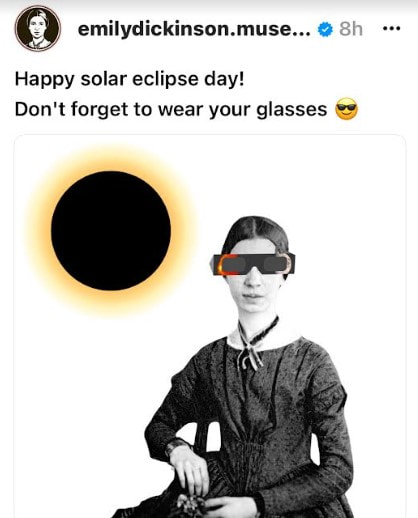
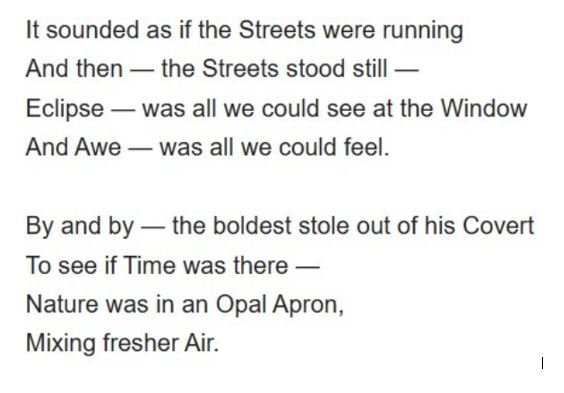
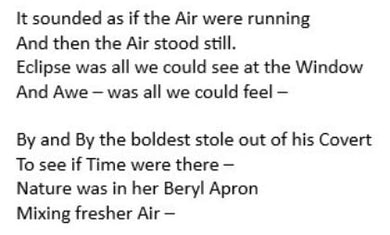
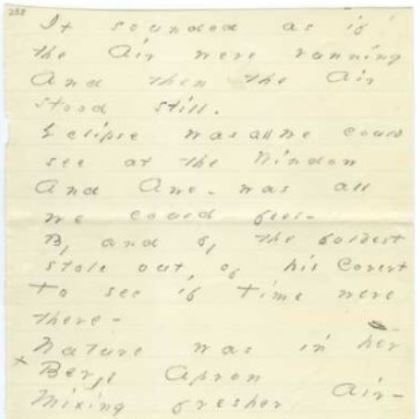
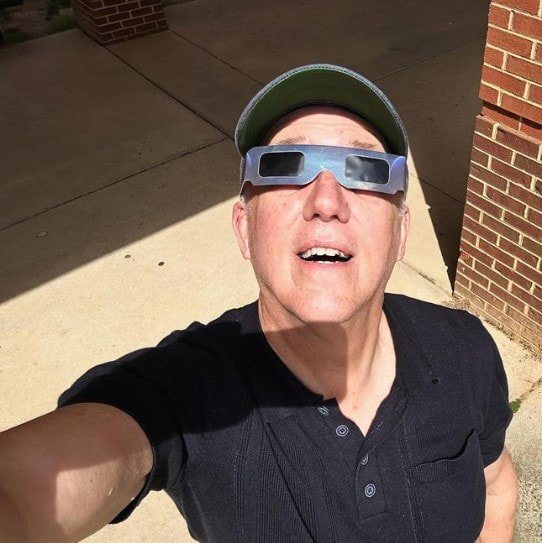
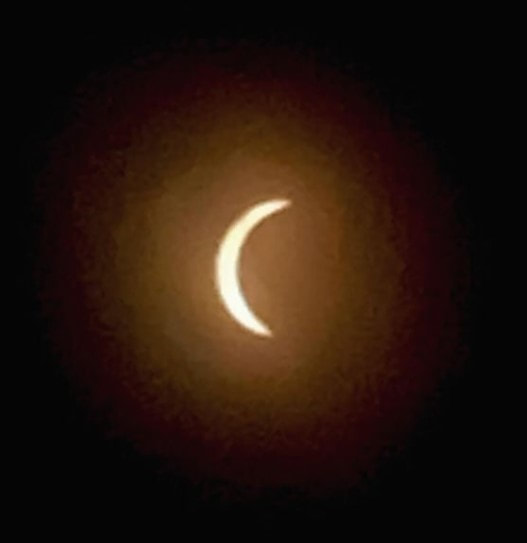
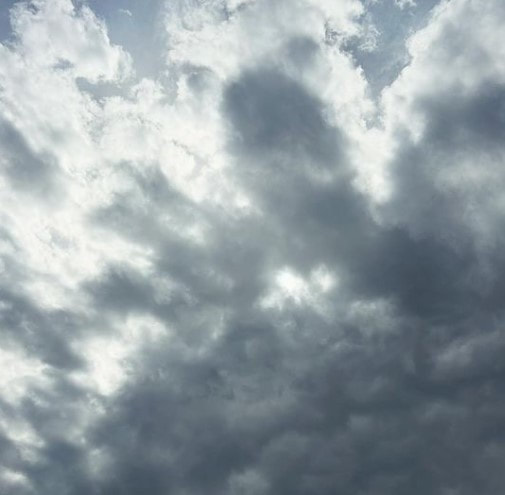
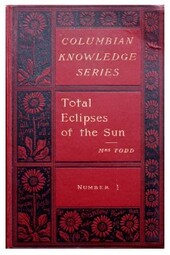
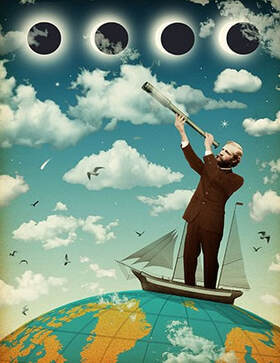
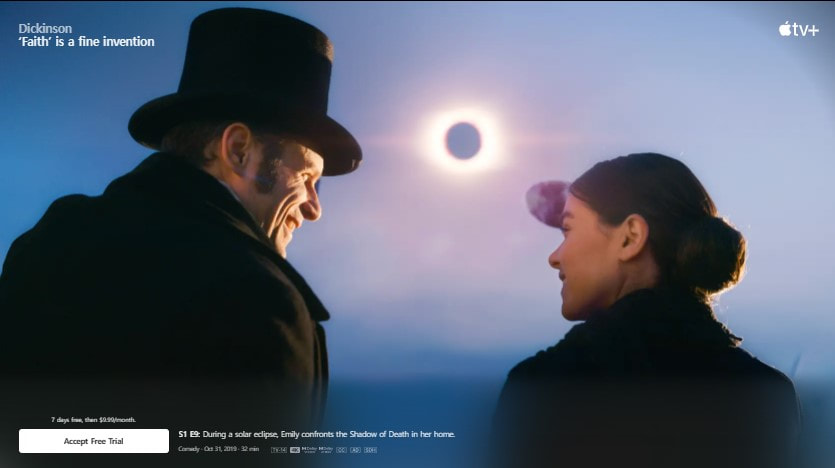
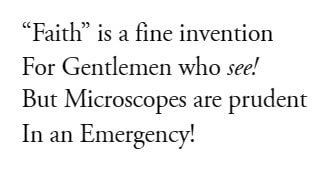
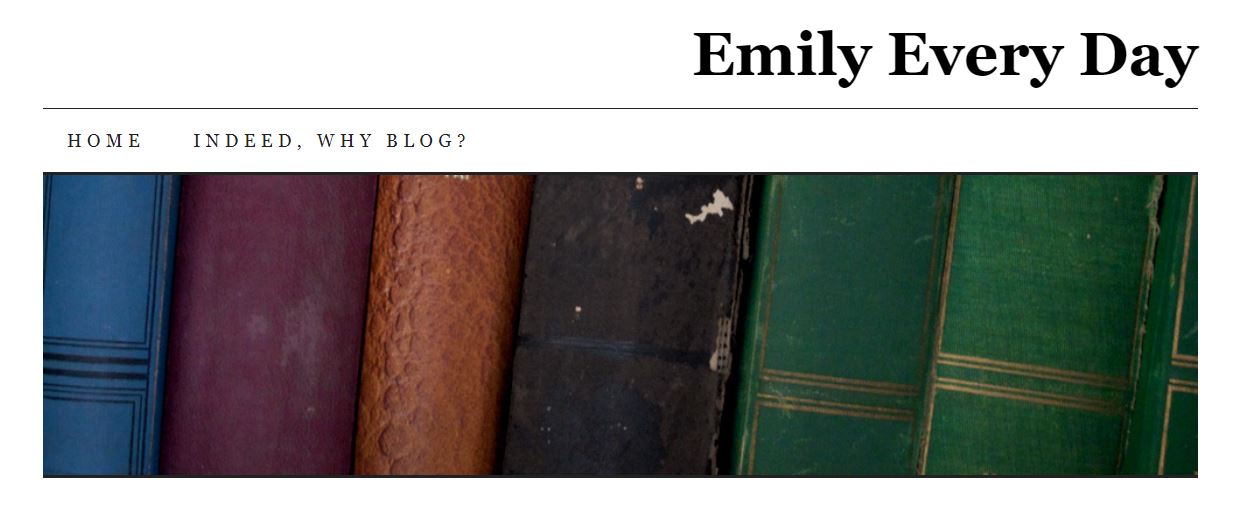
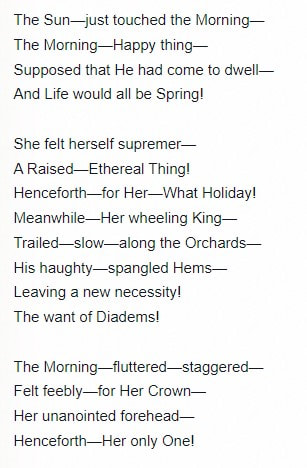
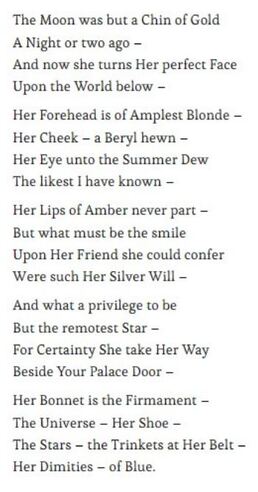
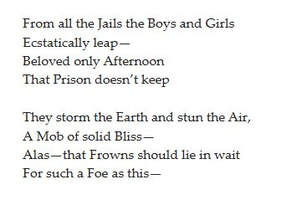
 RSS Feed
RSS Feed
